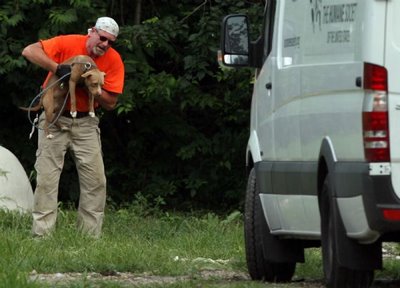
I wrote the following editorial, “The Deserve More than a ‘Humane’ Death,” for the examiner:
Authorities in Missouri seized almost 400 Pit Bull-type dogs as part of a multi-state raid designed to break up dog fighting rings across the country. It was the single largest effort of its kind in the history of humane law enforcement. But while the dogs were “rescued,” they are not yet “saved.” At issue is whether the dogs will live or will be killed by the shelters if and when they ultimately are awarded custody of the dogs by the Courts.
Unfortunately, some statements that are coming out of the agencies involved in the decision-making process are ominous. According to Wayne Pacelle, the CEO of the Humane Society of the United States, most of the dogs will likely be killed: “I think it’s pretty certain that a lot of those dogs will not pass a behavioral test.” Meanwhile, the Humane Society of Missouri, which is housing these dogs, isn’t talking except to say that in a recent case, they killed half of all Pit Bull-type dogs they seized. Is that a bellwether of things to come?
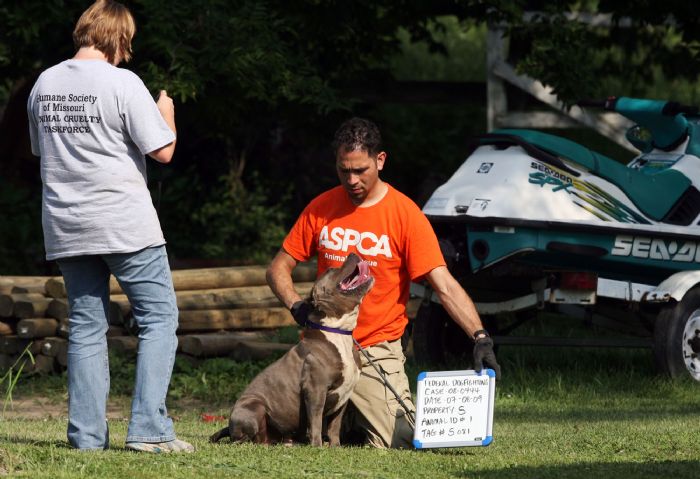
Some see a modicum of hope. Randall Lockwood, who was part of the ASPCA team that evaluated and passed the vast majority of the dog victims of Michael Vick, the 2007 case of the then-Atlanta Falcons Quarterback that took the issue of dogfighting to national prominence, is on the scene in St. Louis. Unfortunately, Lockwood himself made statements to the media about this case that the Vick outcome may not be “replicated.” He also made statements that we should not focus on our differing opinions about what to do with the dogs, but focus on blaming the dog fighters.
No one questions the need to rescue these dogs from the abuse they faced. And the articles appearing on blogs across the country such as one that was aptly titled “scumbags,” adequately convey what we think about the perpetrators. But Lockwood is wrong. The case is in the hands of the U.S. Attorney. So there is nothing more to do on that score. The only choice now is whether, when granted custody of the dogs, the Humane Society of Missouri will kill them or whether the Humane Society of Missouri will not kill them. In fact, that is all we should focus on.
If the Vick tragedy taught us anything, it is that our most basic assumptions about dogs, pit bull-type dogs, and dog aggression, were wrong. In short, it showed we can save virtually all the dogs, even when they were raised for dog fighting and horrifically abused.
After the arrest of former national football league quarterback Michael Vick and the seizure of almost 60 pit bull-type dogs raised for fighting, many animal protection organizations called for the dogs to be killed, arguing that these dogs were vicious and beyond our ability to help them. None made this argument after evaluating the dogs, but based on assumptions about pit bull-type dogs, dog aggression, and dog fighting. After deceptively fundraising off of the dogs, for example, the Humane Society of the United States lobbied to have them killed. Because they believe all Pit Bulls who enter shelters should be slaughtered, it was no surprise that People for the Ethical Treatment of Animals (PETA) also asked the court to put them to death.
In 2008, the court thankfully said “No.” Only one dog was actually killed for aggression after evaluation, and the remaining dogs were placed in either sanctuaries or in loving new homes. Two of the dogs are now even therapy animals, providing comfort to cancer patients. The results forced even dog lovers-but more importantly the humane movement-to question their most basic assumptions about dogs, pit bull-type dogs, and dog aggression. In short, it showed we can save virtually all dogs in shelters.
Secondly, it showed that there is a real, practical, and potentially widespread “third door” between adoption and killing-the network of foster homes, sanctuaries and long term care facilities to provide for animals who may not necessarily be immediate adoption candidates, but can enjoy a good quality of life which would make their killing neither merciful nor ethical.
As a result, we should no longer assume the dogs can’t be adopted or for the ones who are traumatized, rehabilitated first because the vast majority can. In addition, some of the dogs were “bait” dogs because they were not aggressive, or others were used as “breeder” dogs, so have no history of fighting. Moreover, those that were are often very friendly to people. Finally, we do have the ability and skill as a movement to rehabilitate those who are traumatized. As a result, we should assume the opposite: they are savable unless a rigorous, fair, and comprehensive evaluation proves otherwise, which it might—but only for a small number of the dogs. And we should no longer assume there isn’t a sanctuary or even homes for these dogs, since HSUS and the ASPCA have the public relations power, financial wherewithal and global reach which easily prove otherwise.
Given this, we must stop talking about how these are “often broken dogs” or how there might be difficulty finding “available homes.” We need to stop speaking the language of defeatism, the language which frames the debate in a negative light, that condemns some of the dogs without all the facts, that assumes killing may be inevitable, and thus may actually help pave the way for their eventual slaughter.
In other words, we need to put aside unfounded biases and consider the victims of these cruelty cases the way we talk about the animals in other cruelty situations—with regret and condemnation for what they have suffered and with the expectation that whatever agency now has power over them will give these dogs what they deserve. We must assume—as the facts in the Michael Vick case proved—that condemning them as vicious simply because a dog fighter possessed them is guilt by association and unfair. That they were abused doesn’t make the dogs abusive. That they were subjected to violence doesn’t make them violent. That they were unloved doesn’t make them unloving.
In short, we must not echo the unfounded biases which plague our movement and have harmed animals for far too long, with no evidence to support such claims. Instead, we must adopt a language that is optimistic about the dogs and uncompromising in defense of their lives. We must put the ASPCA and the Humane Society of Missouri on notice that we expect them to save these dogs. Because anything short of that clears a path for those who appear bent on destroying them.
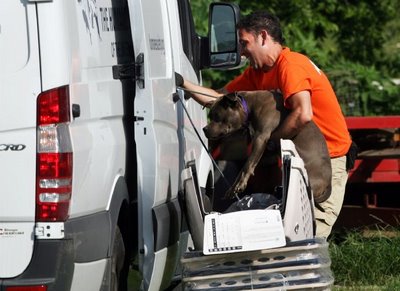
Instead, we must start demanding outcomes—outcomes that include rescuing, rehabilitating, and ultimately saving these dogs. A fair, rigorous evaluation will lead to lifesaving for the vast majority of these dogs and given HSUS and ASPCA wealth, media power, membership in the tens of millions, America’s dog loving culture, and the vast number of available homes, these are not barriers. Even the slide show of photographs from the law enforcement raid shows the rescuers handling the dogs with little restraint, fear, or concern for their own safety. Because, at the end of the day, while rescuing the dogs was crucial and for which we are all grateful, we must also demand a commitment to saving them. After all they have been through, the dogs deserve nothing less.
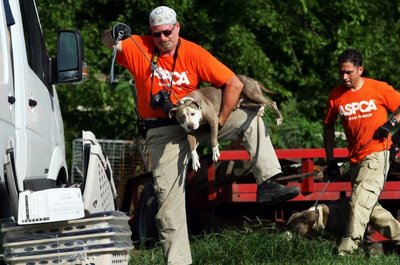
♦
A subsequent statement by the Humane Society of Missouri stated,
While they are being cared for, each dog will be evaluated by animal behavior experts from the Humane Society of Missouri and other organizations to determine their suitability for possible placement with rescue groups or individual adopters. The Humane Society of Missouri will make recommendations about each animal to the U.S. District Court which will make the final decision for each animal… We are committed to giving dogs who have come from such horrible abuse the absolute best chance for a good life…
This is a positive statement. But while we are hopeful, we must remain vigilant. Commitments to giving these dogs “the absolute best chance for a good life” are a welcome change in tone from HSUS which expects them to be killed, from the ASPCA which cautions against expecting the same results as the Vick case (i.e., the dogs being saved), and from PETA which is again calling for their mass slaughter by saying that either individual assessments or actually saving them is “dangerous.” It is also a welcome change in tone by the Humane Society of Missouri which earlier refused to comment on the possible outcomes.
But we are looking for more than a “chance” at life. We are looking for outcomes that ultimately include saving these dogs. Since this case broke, I’ve been sent or have had forwarded some very slick looking fundraising pieces by many groups, even in cases–such as HSUS–where the groups don’t even have care and custody of the dogs. That money, their global reach, their media power, and their millions of animal loving members must be tapped and used to save these dogs.
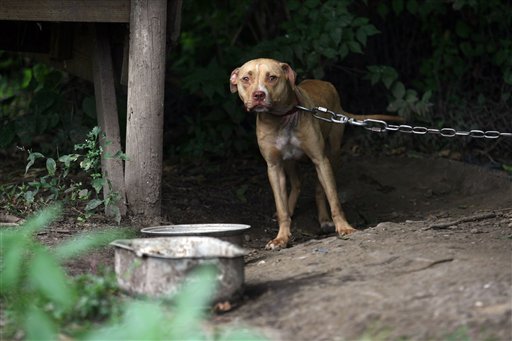
While rescuing the dogs was crucial and for which we are all grateful, we must also demand a commitment to saving them. After all they have been through, the dogs deserve nothing less.